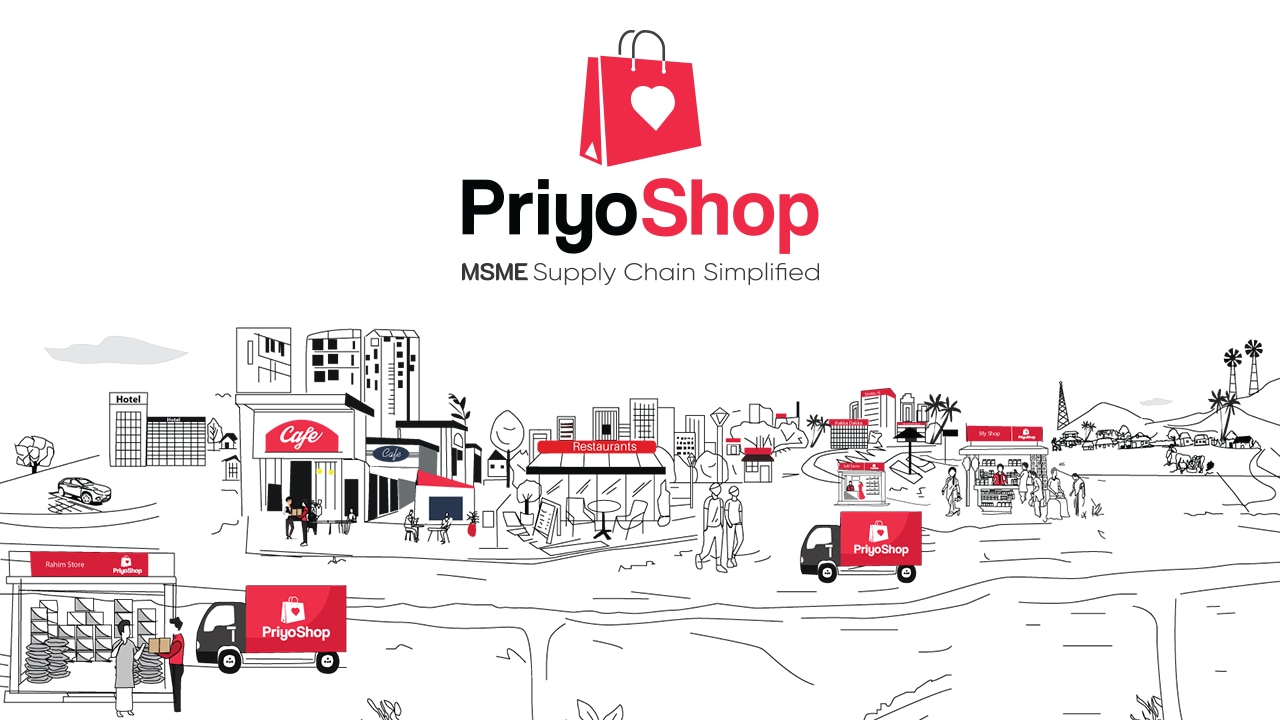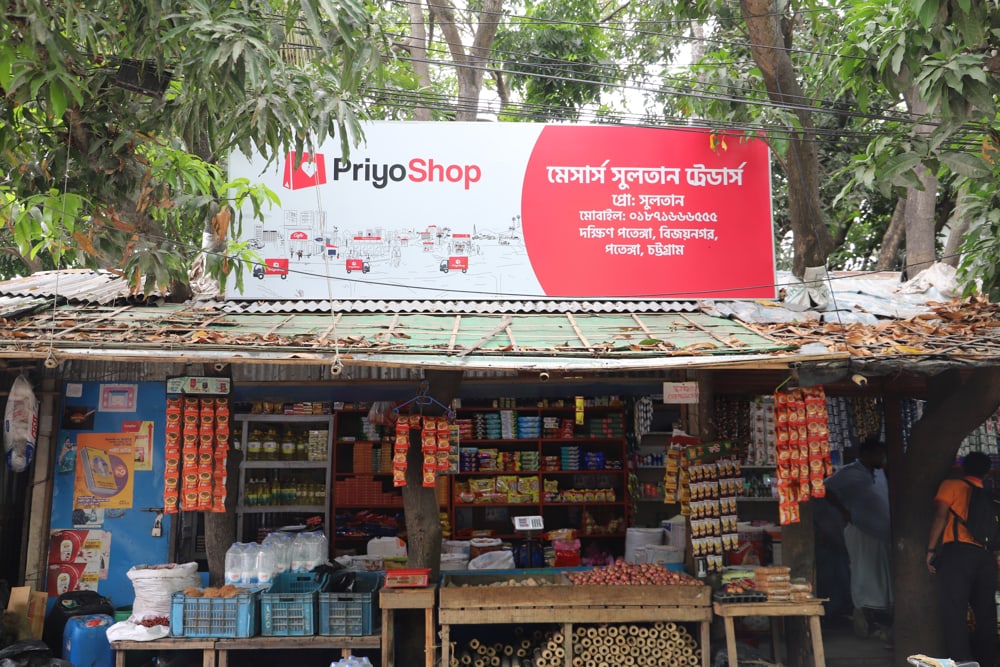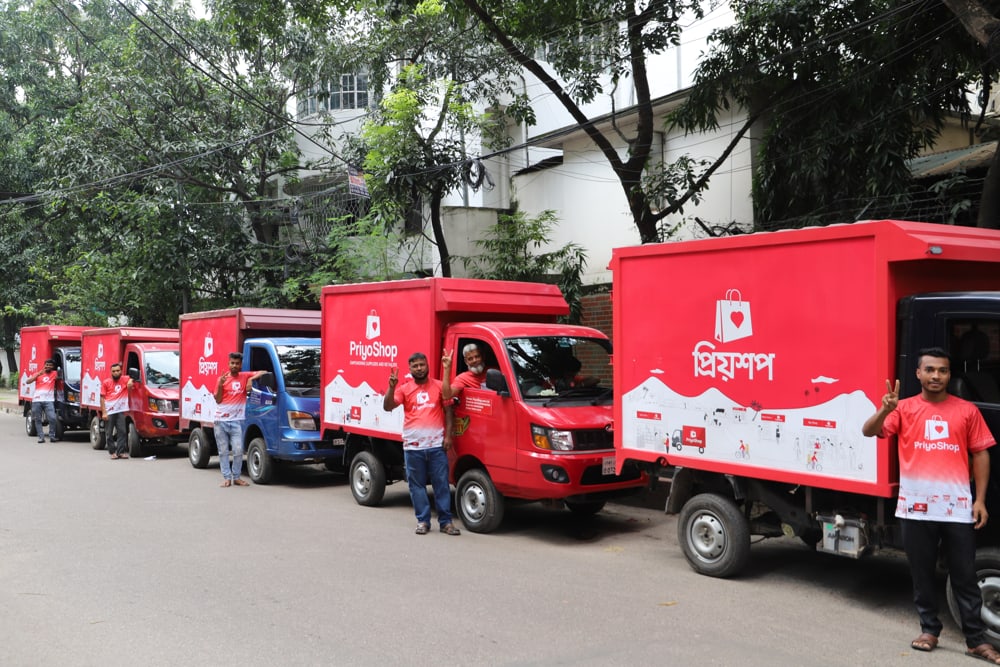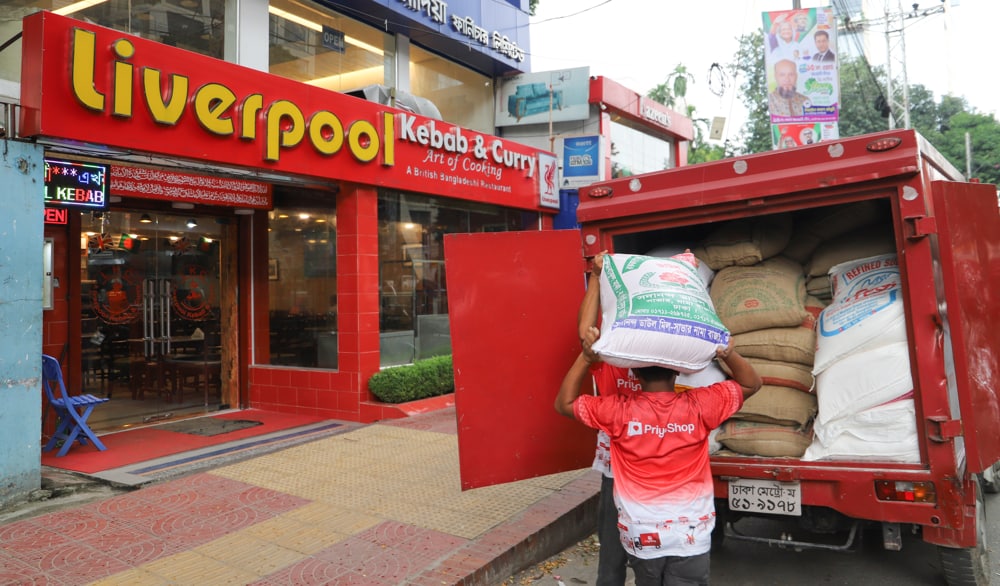
Asikul Alam Khan, the founder and CEO of PriyoShop, started his career as a web entrepreneur in 2006. Before starting PriyoShop, his third venture, he successfully ran an Ed-tech company and an IT firm called Splendor IT. In 2013, he founded a B2C e-commerce platform under the umbrella of Splendor IT. Startups were not yet prominent in Bangladesh back then, so his b2c e-commerce was initially bootstrapped, focusing on building a sustainable business. The company did well by procuring products at lower costs and selling them at a reasonable price and making a profitable margin. “We bought products at a lower cost and sold them with a 25-30% margin,” says Khan.
However, the dynamics of the e-commerce market in Bangladesh changed around 2015, leading to increased competition and new players offering deep discounts, free delivery, and lower commission rates for suppliers. Many new e-commerce platforms entered the market. Competition grew dramatically.
With all the changes in the market, the company found itself in a different unhealthy, and imbalanced environment but persevered by making strategic adjustments.
In 2018, the company shifted its focus from core B2C operations to rural e-commerce, primarily working with mom-and-pop shops. The initial idea was to enable these local retailers to sell a wide range of products, from mobile phones to refrigerators, to their customers through digital catalogs.
While this new direction started to show promise, the outbreak of COVID-19 happened. The subsequent lockdowns negatively affected the mom-and-pop shops. Many had to close down, while others had to adapt their business models.
During this transitional period, many shop owners expressed the need for a more efficient supply chain, prompting PriyoShop to realize the broken state of the retail supply chain in Bangladesh. They requested PriyoShop to supply them with their inventories. This is when Asikul and his team at PriyoShop realized that the retail supply chain is practically broken in Bangladesh.
The supply chain for small businesses in Bangladesh is highly fragmented. With approximately 5 million mom-and-pop shops catering to 170 million people, these businesses face several challenges.
They often need to visit multiple wholesale markets like Karwan Bazaar, Krishi Market, Begum Bazaar, etc. for different commodities. For example: to buy rice, you need to go to Krishi Market. For edible oil, you need to go to Begum Bazar.
Moreover, the traffic conditions in cities exacerbate the problem for these MSMEs. In most cases, these shop owners are a one-man army which means they have to shut down their businesses when they go to purchase supplies.
Purchasing smaller quantities leads to higher prices from wholesalers because when you are purchasing wholesale, the price depends on the quantity. For an individual shop owner, this quantity is naturally small.
Similarly, to carry your small quantity of supplies, you can’t use large and less expensive transport services. Instead, these shop owners use costlier transportation methods, because to transport smaller quality people usually use Rickshaw or CNG.
Additionally, these shop owners don’t maintain formal accounts of their businesses which restricts their access to credit facilities.
Traditional distributors, while providing delivery services, operate on their own schedules rather than accommodating the needs of shop owners and brands. They collect demand once a week and deliver the orders the next week. This leads to delays of 7 to 12 days in delivering orders, affecting the availability of products and causing potential loss of customers. Brands also lose their base when customers turn to alternative options due to supply issues.

While e-commerce and large stores cover a mere fraction of Bangladesh's total retail ecosystem, estimated at around $191 billion, small businesses command 97% of the market share.
However, the fragmented supply chain and lack of connectivity with suppliers present significant challenges for these businesses, as well as for suppliers, brands, and distributors. It is inefficient and costly. And all these players are always losing productivity.
Recognizing these hurdles in the retail market, PriyoShop identified an opportunity to empower mom-and-pop shops by connecting them with suppliers through technology. Rather than competing with existing players in the market, PriyoShop chose to collaborate with traditional distributors, leveraging their infrastructure.
The decision to pivot from B2C to B2B was driven by the realization that addressing the challenges faced by small mom-and-pop shops and suppliers presented a much bigger opportunity for PriyoShop.
By understanding the market landscape and engaging with retailers and distributors, the company laid the foundation for building an efficient platform that connects all stakeholders.
PriyoShop already had strong connections with lots of manufacturers, distributors, suppliers, and FMCG brands. The company saw that it could leverage its existing connections and created a platform.
Moreover, there were not many players solving the problem at the time. The few players in space were dealing with different categories with different strategies. Some were catering to corporate/big companies, providing corporate supplies. Others were operating more like distributors.
Taking stock of the existing market landscape, the company realized that by addressing these challenges, it can empower both traditional suppliers and mom-and-pop shops through technology.
After much deliberation, PriyoShop decided to pivot towards a B2B model, connecting these traditional suppliers with mom-and-pop shops to enhance the efficiency of the supply chain. Instead of competing with the existing players in the space, the company decided to work with traditional distributors who have infrastructure instead of competing with them.
“This evolution of PriyoShop was the result of the ideas we received from our small mom-and-pop shops at the time,” explains Khan. “In our earlier business model, we worked with MSMEs, solving a different problem. We thought we could accelerate their business and solve their problem by empowering them through technology. That was our goal when we first conceived our B2B idea.”
In the midst of the COVID pandemic in Q4 of 2020, PriyoShop embarked on a strategic pivot from B2C to B2B ecommerce. The transition was a deliberate process that involved understanding the market, interacting with mom-and-pop shops, retailers, and distributors, and identifying the existing challenges in the supply chain. This groundwork laid the foundation for an efficient platform that seamlessly connects all stakeholders.
“Once we made the decision, our core team started working on it right away,” explains Khan. “We met with lots of mom-and-pop shops. We visited and talked with them. We visited lots of distribution houses and wholesale markets to find out the existing challenges in the supply chain.”
The company now serves as a vital link between MSMEs and suppliers/brands, effectively resolving the fragmented supply chain issues prevailing in the market.
PriyoShop finally pivoted in July 2021 to become a full-fledged B2B marketplace. The company now connects MSMEs and suppliers and brands, effectively solving the fragmented supply chain issues in the market.
As noted earlier, the decision to pivot from B2C to B2B was driven by the immense market potential in serving the fragmented mom-and-pop shop ecosystem.
PriyoShop's prior experience in eCommerce, along with their established connections with distributors and suppliers, positioned the company well to address the challenges faced by mom-and-pop shops and accelerate their business growth.
The company identified a key missing piece in the traditional supply chain. While many traditional suppliers and distributors in Bangladesh have robust infrastructures, including large warehouses and trained personnel, these suppliers don't have any connection with these mom-and-pop shops. The lack of connectivity hindered their access to mom-and-pop shops and market demand data.
To counteract the problem, PriyoShop has developed a platform that seamlessly connects mom-and-pop shops with suppliers and distributors.
Suppliers/brands/distributors can upload the details of their products to the PriyoShop platform. Mom-and-pop shops can easily browse and order products via a user-friendly app and/or through WhatsApp. Notifications are sent to brands and distributors upon order placement, ensuring efficient fulfillment and timely delivery.
The company has adopted an asset-light model that eliminates the need for large warehouses, with third-party vehicles used for logistics.

PriyoShop is essentially a platform that connects all these retail stakeholders and empowers them to operate more efficiently. The company has a website, an app, and Whatsapp API integration.
PriyoShop works with manufacturers, distributors, suppliers, and brands who can share their product information to the PriyoShop platform and showcase their products to get orders from the merchants aka mom-and-pop shops.
PriyoShop connects brands, manufacturers, and suppliers with mom-and-pop shops and merchants under one platform.
Mom-and-pop shops can download the PriyoShop app from Google Play Store. The app is in Bangla which makes it easier for everyone to understand and navigate.
Retailers can browse SKUs by category, by brand and order products simply by clicking on them. The company has simplified the whole thing with the understanding that most of its users are not tech-savvy.
PriyoShop has also launched a Whatsapp B2B Marketplace with the help of API integration where mom-and-pop shop owners can access the entire PriyoShop catalog via WhatsApp. This approach caters to users with low-configuration phones, ensuring accessibility and convenience. This makes sense because many of the mom-and-pop shop owners are not essentially tech-savvy. The company says it has received excellent responses from users after the launch of WhatsApp API.
PriyoShop is notified when there is an order placed. After getting the notification, brands confirm the availability of the product, and PriyoShop collects the products from distributors and delivers them to mom-and-pop shops.
PriyoShop initially focused on covering specific areas of Dhaka and Chittagong and has now expanded its reach to include the entire Dhaka city, along with sub-Dhaka areas such as Tongi, Gazipur, and Savar. The company plans to add two new regions each month. Furthermore, PriyoShop continually onboards new suppliers, enabling the expansion of its product catalog and ensuring a diverse range of offerings for its customers.
“By making investments in technology, the supply chain, and a data-enabled credit offering, we take a long-term approach to resolving the fundamental issues facing traditional retailers,” explains Khan. “We build a business that combines working capital, logistics and commerce with PriyoShop. PriyoShop becomes a one-stop shop for everyone by assisting small retailers in resolving supply chain, inventory and working capital inefficiencies.”
At its core, PriyoShop functions as a platform that connects manufacturers, distributors, suppliers, and brands with mom-and-pop shops. Through the PriyoShop app and WhatsApp API integration, mom-and-pop shop owners can buy their essentials for their shops.
PriyoShop’s business model revolves around suppliers and brands paying PriyoShop for the platform’s services, while the mom-and-pop shops receive the benefits free of cost delivery. Revenue is generated through margins earned from suppliers, which are utilized for marketing and logistics expenses.
By utilizing third-party vehicles for logistics and maintaining fulfillment centers, PriyoShop ensures efficient operations without the need for large warehouses or large teams.
“Our business model is simple,” says Khan. “We connect suppliers, brands and financial Institutions directly with these mom-and-pop shops. We use third-party vehicles for logistics and our people to ensure the quality of distribution and customer service. Using third-party vehicles reduce the need of large warehouses or lots of people.”
Once a mom-and-pop shop places orders, the supplier gets a notification and confirms the availability of the product. PriyoShop has fulfillment centers in the areas it operates.
Sometimes suppliers drop their inventory at the Priyoshop fulfillment center, and sometimes PriyoShop pickers collect products from suppliers. The next morning, the PriyoShop team delivers all the products to its merchants.
Merchants usually get the best price on the PriyoShop platform. Since a lot of suppliers upload their products to the platform it creates a competitive dynamics resulting in competitive price. Moreover, there is complete price transparency which is rarely the case in the world of offline where it is hard to know the actual wholesale rate. PriyoShop changes these rules.
“We have worked hard to make the platform useful for the merchants. They get the best price,” says Khan. “They don't need to provide logistic fees. Working with PriyoShop usually improves revenue for these micro-merchants by 20% to 30%.”
PiryoShop is equally quality-conscious. Suppliers go through a rigorous onboarding process that ensures that anyone cannot upload their SKUs to the PriyoShop platform.
The company says it ensures the quality of the product and mostly works with renowned suppliers and brands.
PriyoShop works with third-party logistics companies for logistics. 3PL companies provide vehicles, and PriyoShop takes care of the rest.
Currently, PriyoShop has four fulfillment centers in Dhaka and one in Chittagong. Suppliers send the products to PriyoShop fulfillment centers and the company delivers the goods to merchants.
The company uses a hyperlocal model similar to food delivery companies such as Foodpanda. For merchants in a certain area, the company works with suppliers from that same area. For instance, when it serves merchants in Chittagong, the company works with distributors and suppliers who are based in Chittagong.
PriyoShop currently has over 30,000 merchants on its platform and works with over 150 suppliers.
The company says it takes both ends of its marketplace seriously. A growing supplier network allows the company to add additional products/SKUs to its catalog that it can then supply to its existing customers. A growing merchants network allows the company to generate more demand for its existing suppliers. So there is a network effect at work — one part of the marketplace reinforces the other.
The company, however, says the most important metric for it is the number of active merchants who place orders on a weekly and monthly basis, which currently stands at 70%.
Currently, PriyoShop delivers orders within 24 hours max based on the distance and product availability. The shortest time is six hours. The mom-and-pop shops can order their best-selling products such as rice, edible oil, flour, sugar, salt, and many other products from PrioShop. These commodities are usually about 60% of their basket.
The company says it has exclusivity partnerships with Pusti by TK Group, works with most of the prominent FMCG brands, and is closely working with all the local rice brands. Growing the SKUs it supplies to its merchants through these partnerships with suppliers and brands remains a key priority for the company.
PriyoShop has built a fascinating business model. The platform connects all these different players. Since it relies on the existing infrastructure of its partners, it can run on an asset-light model. Being a platform allows it to expand in multiple directions.
“We are a marketplace platform that disrupts the currently fragmented supply chain by connecting 5 million underserved retailers across Bangladesh directly to manufacturers, distributors, and wholesalers,” says Khan. “We don’t buy goods, we don’t carry inventory, and we don’t sell anything. Our only burn is for operations and salary. Our business model ensures high capital efficiency and very manageable expenses. We adopted a marketplace model, going for an asset-light strategy and offering value-added services (credit offerings, data analytics, advertisements).”

However, amidst this landscape of change, PriyoShop stands as a unique opportunity to revolutionize the market.
There are 5 million retailers in Bangladesh and 70,000 new retailers are joining the industry every year. 30% of the country's GDP is directly contributed by retail. Several estimates suggest small mom-and-pop shops generate some $191.7 billion in sales annually.
The retail market in Bangladesh is traditional. From sourcing to collecting products and delivering them to retailers, most things are done manually. Mom-and-pop shops and suppliers, manufacturers, and brands face many challenges due to the offline nature of the industry. The market is poised for technological disruption. However, things are changing.
The retail market in Bangladesh is slowly undergoing a significant shift, driven by the rapid rise of digitization across sectors.
B2C commerce has already embraced digitization, it is a matter of time before we see major changes in the B2B.
In the past, I’ve written elsewhere that great organizations are built on shifting landscapes when major changes are going on in the market. The digital transformation of commerce is one of the major shifts of our time. In Bangladesh, this transformation is happening right now and it has taken a unique shape. This offers a huge opportunity for a company like PriyoShop.
PriyoShop is poised to become one of the primary beneficiaries of Bangladesh's digital transformation in the retail landscape. While it won't capture all the value created in this process, it will serve as a facilitator, leveraging the fast-growing digital commerce ecosystem. As more mom-and-pop shops embrace digital channels, it will create additional opportunities for PriyoShop to expand its influence in B2B digital commerce.
The biggest challenge for PriyoShop is to educate the MSMEs as the market remains technology resistant. The smartphones/technologies use for problem-solving are not something common in this sector, hindering the transition.
Similarly, many suppliers are comfortable with the existing strategy of accepting purchase orders in advance — typically 2-3 days before delivery and then organizing inventories. Because of capital constraints, suppliers — usually wholesalers handle 2-3 loads each day with the same vehicles. There are events where cars break down, problems arise during the time of transportation such as legal problems with traffic authorities, which result in unfulfillment.
Bangladesh’s traditional trade remains cash-driven. Wholesalers and retailers are concerned about the tax implications and the need to declare earnings to the tax authorities — further complicating digital adoption.
“The other major challenge is finding the right people. As a fast-growing company, sometimes it is a challenge to hire the right people,” says Khan. “That is a major challenge for us at this point. We are growing at a consistent pace. We are unlocking new milestones regularly. When you have a growing operation, you need people to maintain the quality standard.”
Overcoming these challenges requires PriyoShop's commercial team to go through a long process. The company starts by acquiring merchandise from a supplier. Once the supplier is onboarded, the next task is to convert them to the marketplace platform. PriyoShop's commercial team meets with each supplier to convince them to switch to the marketplace.
Despite these hurdles, PriyoShop says it has been able to work with over a hundred suppliers like Coca-Cola, BEOL, Pran Agro, and a growing list of others.
The company has also expanded into the HoReCa area, a sector that is said to be growing at a rate of 25.6% per year and also faces a ton of supply chain challenges.
PriyoShop has taken a systematic and deliberate approach to growing its business. Instead of rushing into it, the company says it wants to grow with its customers.
“From the beginning, we have been 100% focused on unit economics,” says Khan. “As I earlier mentioned, I'm a three-time founder and all my teammates have prior experience in the sector. My co-founder Dipty Mandal comes from a telco background. She also worked with B2C e-commerce platforms. We have built a 100% OKR-driven operation. Performance is the priority. When you are a startup in a new vertical, it is a challenge. Regardless, we have tried to build a sustainable business from day one.”
PriyoShop has built a cost-efficient operation that makes things easier for it on several fronts.
“We have been able to build a solid organization. We operate as a team,” adds Khan.
Priyoshop has set several long and short-term goals. The company started its B2B commerce business in 2021. Within a short period, it has grown significantly. It also says that it has grown using a sustainable strategy.
The company received investment from some of the prominent local and regional investors, which is a validation of its ideas.
In 2023, PriyoShop says it plans to cover 50 new areas of expansion and add 100,000 micro-merchants to its platform. In the long term, the company wants to cater to one million micro-merchants through the PriyoShop platform, offering a complete ecosystem that encompasses supplies, financing, operational management solutions, and sales.
“It's not only about supplies, we want to cater four things to these micro-merchants: supplies, financing, solutions to manage their operations, and sales,” explains Khan. “Our goal is to build a complete ecosystem. We are trying to add more value every day.”
Furthermore, the company envisions international expansion, with plans to enter untapped markets and replicate its success. The plan makes sense given the relevance of its solution for MSMEs in many emerging markets.
“We have seen some initiatives in markets like Indonesia, Vietnam, India, Pakistan and recently, the MENA,” explains Khan. “But there are many other untapped markets. So we have the ambition to expand internationally and our investors also are trying to help us to enter the next market.”
On the product expansion side, PriyoShop is already in discussion with several financial institutions to launch a financial product for its MSME merchants. There is a significant interest in SME lending through digital platforms but there has not been any breakthrough as yet. But as the market matures, it should open new doors of opportunities for PriyoShop and others in the space.
These are the early days for B2B digital commerce in Bangladesh. PriyoShop certainly enjoys early mover advantages and similarly faces the challenges of market development. Given the task at hand and the opportunity in sight, the company has done a good job. We will have to wait to see where it goes with the momentum.
“Last year, we did some great things; we broadened our territory and worked with a large number of retailers, restaurants and coffee shops and empowered these businesses,” says Khan. “Though the journey was not smooth, we accomplished more than our assumptions. Our focus is to create an impact on all the MSMEs from Teknaf to Tetulia and boost their business.”
This story was produced under the FS partner program.
